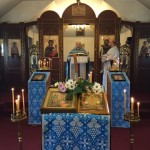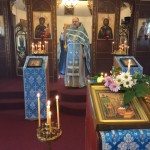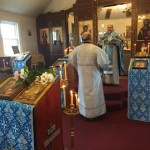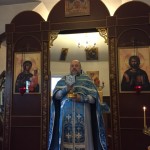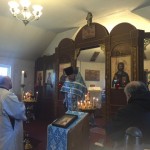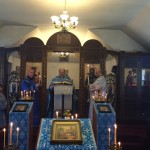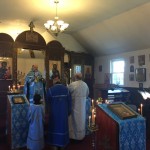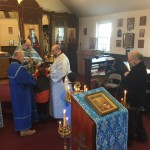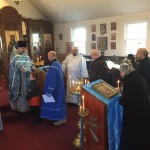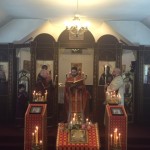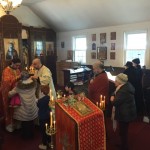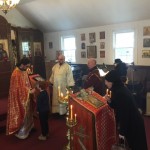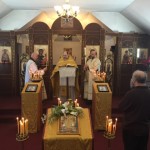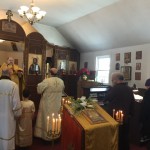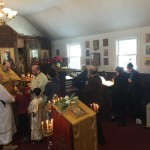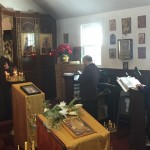On February 21, 2016 by the decree of His Eminence, Bishop John, Rector of St. George Church, Archpriest Igor Tarasov had been appointed new Dean of the Eastern States of the Patriarchal Parishes.
The Eastern States Deanery which now will be headed by our Rector includes 8 parishes located in the States of New York, New Jersey and New Hampshire.
Monthly Archives: February 2016
St. George’s Young Parishioner Won the Chess Tournament
Our very young parishioner, John (Ethan) Kay have won in the chess tournament organized by the Long Island Chess Center of Massapequa, NY. John had been awarded first place in that competition held on February 21.
We are very proud to have such a bright young parishioner. Congratulations to John (Ethan) and many more chess victories!
Sunday of the Publican and Pharisee
On February 21, on the Sunday of the Publican and Pharisee, Rector of St. George Church, Archpriest Igor Tarasov served the Divine Liturgy for our parish community. After the Gospel lesson he preached the following homily in English:
“In today’s reading from the Gospel our Lord tells us that two men went up to the Temple to pray. One of them, who was a public sinner, went home justified. Yet another who was viewed as a just man was condemned. Why? Simply because of their attitudes: the publican has the right attitude. He is asking God for mercy in repentance for his sins of which he is conscious. On the other hand, the Pharisee has the wrong attitude. He is not asking for mercy. On the contrary, he is satisfied with himself. He is under the illusion of being righteous. And he has this illusion merely because he fulfils all the outward observances of the Jewish Law. His piety is all for show, it is all outward and does not come from the heart. We may say that the Pharisee does the right things, but he does them for all the wrong reasons, and thus they lose all their force.”
“The error of the Pharisee is to confuse the means with the ends. Our end, or goal, is to find salvation. There are many means to salvation, to preparing our souls to be with God. However, we should not think that the means to salvation automatically bring salvation, merely because they are outwardly observed. In order to understand this, we first need to know what the means to salvation are.”
“First of all, we have to worship God and pray to Him. True, we can worship and pray to God everywhere, but there is one place where we can be particularly close to Him, and where it is easier to speak to Him in prayer, and that is at church. Only at church are services held in His honor and we can thank Him, worship Him and pray to Him more easily during those services and only at church can we partake of the Sacraments.”
“Secondly, we can deepen our worship of God through reading and obeying His Word, through fasting and through almsgiving. Just as worship, prayer, reading of the Word of God and almsgiving are only means to salvation, and not salvation itself, so fasting too is only a means to drawing closer to God. It is an experience of the spiritual people that fasting helps us to reach certain spiritual state to be closer to our goal of salvation. It is said: “We are what we eat”. It makes sense not only for our body, but for our soul. But fasting is not a goal by itself. The Church therefore does not ask us to fast twelve months of the year. It asks us through Great Lent, the three other Fasts, and Wednesdays and Fridays, to fast for six months of the year. The Church’s approach is balanced. That is why this coming week, there is no fast – to remind us that although salvation is not in fasting, on the other hand, it is also true that fasting for Christ’s sake will help us draw closer to salvation.”
““We are what we eat”. We can see this especially clearly in holy Communion. If we come to Communion frequently, we are with Christ and He is with us. But if on the other hand, we never come to Communion, then we shall never be with Christ and He will never be with us: “We are what we eat”.”
“We may come to a conclusion that if we sincerely, from our hearts, worship and pray to God, read His words, fast and give alms, then we are not behaving as the Pharisee, but as the publican, we are asking for mercy, and thus we find justification. Not justification because of our outward actions, but justification through the Mercy of God, which alone makes our salvation possible. In doing all these things, we are actually saying the Prayer of the Publican, which is at the root of the Jesus Prayer: “God, be merciful to me a sinner”. For it is only the Mercy of God, given as a gift to us for our sincerity, which brings us into His presence, bringing us salvation, for our God is merciful and He loves mankind.”
Before the Holy Communion the parish choir prayerfully sang penitential hymns from the Lenten Triodion, the liturgical book the Church begins to use on this Sunday.
Following the dismissal of the Liturgy the Rector preached a brief sermon in Russian pointing out that we should avoid the Pharisee’s attitude of pride but to imitate the Publican’s sense of sinfulness and his repentance. “We should act outwardly like a Pharisee but to think and pray like the Publican,” – concluded the Rector.
37th Sunday after Pentecost. Feast of the Meeting of the Lord
On February 14, on the 37th Sunday after Pentecost, Rector of St. George Church, Archpriest Igor Tarasov served the Divine Liturgy in our temple. On this day we also celebrated holy day of the Meeting of the Lord which had been transferred to Sunday. Despite a very cold weather, a sufficient number our parishioners attended the church.
Following the Gospel readings the Rector preached a homily in Russian. In that homily he combined the main themes of the Gospel lessons assigned for this Sunday (Lk. 19, 1-10) and for the feast of the Meeting of the Lord (Lk. 2, 22-40). Fr. Igor said that both Gospel readings tell us about a meeting between a sinful man and sinless God. The whole purpose of the Lord Jesus Christ coming into our world was to make such a meeting possible. If Adam turned away from God and was expelled from God’s glory and from constant communication with God, Christ did reconcile sinful man with sinless God. Zacchaeus, a publican and a public sinner, wished to see the Lord, made an effort climbing on a tree, and Jesus blessed him and proclaimed salvation for him. Righteous elder Simeon also expected to encounter the Lord, the Messiah, and Jesus being a small Child, made that encounter come true. We need to serve the Lord and to remember that our own meeting with Him may happen every moment. This is so because, according to the teaching of the Holy Fathers, every moment, every day in our life is the best for our salvation. God’s Providence arranges thus. And our encounter with the Lord is possible any time because we any time we may leave this earthly life, like Simeon did after seeing the Chris of God. Therefore, we need to be ready for such a meeting all the time, to make efforts like Zacchaeus and to expect like righteous Simeon.
Following the dismissal of the Liturgy the Rector and the altar servers came before the icon of the feast and performed the rite of Glorification singing the troparion, kontakion and magnification of the Meeting.
After that the Rector had a short sermon in English explaining his homily previously preached in Russian.
Following the service Rector and parishioners had an opportunity to continue their celebration at the trapeza table where they enjoyed delicious meals and interesting conversations.
36th Sunday after Pentecost. Synaxis of the New Martyrs and Confessors of the Russian Church
On February 7, on the 36th Sunday after Pentecost, as well as feast of the Synaxis of the New Martyrs and Confessors of the Russian Church, our Parish had a nice liturgical service. In the Rector’s absence the Divine Liturgy was served by Priest Aleksiy Paranyuk from St. Nicholas Cathedral. Following the Scripture readings he preached a homily interpreting the Gospel lesson.
At the end of the Liturgy Fr. Aleksiy performed the Memorial service (Litia) to commemorate all the departed who perished or were put to death at the time of godless persecutions of the 20th century.
35th Sunday after Pentecost
On January 31st, on the 35th Sunday after Pentecost, we had a nice liturgical celebration at St. George Church. Our Rector, Archpriest Igor Tarasov served the Divine Liturgy. Following the Gospel lesson he preached a homily in English.
In his homily the Rector spoke about eternal life and reflected upon different ideas a Christian mind can have about it. Since the Gospel lesson was telling a story of a young ruler who asked Jesus how to enter into eternal life (Lk. 18, 18-27), such an important subject was appropriate for the sermon.
After the dismissal of the Liturgy the Rector congratulated our young parishioner Anton Malyshew, as well as his stepmother Maria Malyshew on the occasion of their name days (January 30 and 31). Traditional Polychronion was sung.
Following the Liturgy we had an opportunity to listen to a brief speech of a missionary priest, Archimandrite Juvenal (Repass) who was present in our temple and prayed at the Divine Liturgy. After the service ha told about his missionary work in Guatemala and invited parishioners to make charitable donations for that noble cause.


